-
Posts
919 -
Joined
-
Last visited
-
Days Won
255
Content Type
Profiles
Forums
Gallery
Events
Articles
Blogs
Downloads
Community Map
Posts posted by DianeB
-
-
We’re all here, and we’re out of the starting gate.
Trevecca’s main hall filled once again this morning with three score eager guitarists. With so many new faces around me, introductions spun out one after another. Paulette said there was no one this year from outside the U.S. Steve welcomed everyone, settled us down and called for questions. From the other side of the room I heard: “Steve, is your online moderator Diane here?” With that, any chance of staying under the radar was shot.
Our first task was to get warmed up with stretches, then came Steve’s workout with basic chords. Flatpicker David Grier’s masterclass was indeed a class, as he not only entertained us but also patiently explained his techniques and how he learns them. I must paraphrase, but David urged us to play with people who are better musicians, and ask them how they do what they do. Persevere. It can be something simple, but play in time. How reassuring to hear a virtuoso admit, “the simplest things will befuddle me”.
With no lunch service on campus, we had to scatter and scrounge. Greg Otto and I followed the GPS-recommended, presumably scenic, route to M. L. Roses — mobbed as usual — but found a table and managed to return without crossing county lines.
I hurried back inside, scooped up my gear, and scurried past a crowded room where Collin Hill started up his finger style workshop. Seeking something new this year, I parked in the back of Kim McClean’s session on songwriting. Elsewhere, Greg Voros taught setup and maintenance, and Paulette covered introductory music theory.
Steve had about half of us for his blues basics workshop while the jazzers found their sevenths on the second floor with Andy Reiss. We broke into six groups of about ten each for beginner, bluegrass, jazz, and blues jams. My blues group was led by our friend Dino Pastin and his son Vince. We were all skill levels, and I could see we were all having a ball. Bluegrass pro Jim Hurst closed out the day with sincere advice to make your music your own and play from your heart.
As I finished a solo dinner, I realized I was about to fall asleep right in my food. Outside I saw road work, and I remembered Kim’s challenge to write a song for tomorrow. Write a song? I could barely chew. But I had an idea. Two words, a title perhaps. I drove back to Trevecca, parked in the shade, sat in the AC and wrote a verse on my iPad. Hardly thinking, I took out my phone and sang it to a melody that came from — wherever they come from. Then a chorus. Recorded that, too. Tweaked the title. Geez, I thought, this is already half a song. Suddenly I was awake.
We closed out the night with an acoustic concert featuring master fingerstylists Collin, Parker Hastings, and Joe Robinson. What a first day. Maybe by lunch tomorrow I’ll have a song for Kim.
-
 13
13
-
-
I stepped out of my car into a warm, sunny, muggy afternoon in Nashville. On the seat, I saw a glint of blue and green — two picks I thought were already lost. A good omen. With me behind the music building at Trevecca sat only a single blue SUV, but I recognized it as the one that matters. We were back.
Paulette greeted me with a big smile and a warm hug. She had already set up the store, organized the goodie bags, and arranged the chairs. The stage was assembled, and Timothy arrived with the ice. Nothing left for me to do. I treaded softly up the steps toward a familiar figure who was tweaking a video message board.
“Just make sure I look good,” I said with a smile. Another big hug, from Steve. I left him to his preparations and returned to the rehearsal hall. Others were arriving. Paulette said we were up to 61 this time, along with some spouses. Soon we had about half that number for the meet and greet.
We had serious catching up to do over our ice cream. The room filled with animated, excited chatter as the first timers met the old hands — and I suppose that now I fall into the latter group. It’s particularly nice to meet in person for the first time someone you’ve only known through the discussion board. And there are many first timers. Attendance this year is a bit off. There were 90 plus here in 2019. I suspect that the pandemic took its toll on budgets, priorities, and even health.
But here, for a few days, anticipation, fellowship, and music will be in the air. We’re already thinking of our guitar friends who just can’t be with us. Wherever you are, tune up and play along with us in spirit.
We are back.
-
 12
12
-
-
@Dave White has updated this list as of July 10, 2021. It's attached as a PDF below because we had difficulty maintaining the links. As Dave advises: Note the hours of operation – some shops continue to only be open by appointment. My advice is to call and check with each shop in advance of your visit. There's info on:
• Artisan Guitars
• Carter Vintage Guitars
• Gruhn Guitars
• The North American Guitar (formerly Cotten Music) -
@QuietlyBold Welcome back! You're probably still finding your way around the new neighborhood. Here is Steve's piece on setting up a practice space. Attached below is a 2015 booklet from DiskMakers on setting up a home studio. I hope these can get you thinking.
-
 2
2
-
 1
1
-
-
As of June 30, we have 52:
Eric A.
Tim B.
Clarke B.
Diane B.
Dennis B.
Gene C.
Mark C.
Ken C.
Deano C.
Andrew C.
Douglas C.
Michael D.
Steve D.
Jim F.
Paulette F.
Lucio F.
John G.
Thomas H.
Paul H.
Steven H.
Lyle J.
Itachak K.
Patricia L.
Jack L.
Susan M.
Charles M.
David Mc.
Jerry M.
David Me.
John M.
William N.
Thomas N.
Greg O.
Kraig P.
Eric P.
Lynn R.
Steve R.
Rick R.
Wiliam R.
John Sib.
John Sik.
Ernest S.
Brian S.
Elizabeth S.
Chris S.
Robert S.
Gerald T.
Reginald W.
David W.
Daryl W.
Kenneth W.
Roxanne Z.# # #
-
 3
3
-
-
American Masters presents the broadcast premiere of Buddy Guy: The Blues Chase the Blues Away, a new documentary on living legend George “Buddy” Guy, a blues master who transcended his early years as a sharecropper in Lettsworth, Louisiana to become one of the most influential guitarists of all time. A Rock and Roll Hall of Fame inductee and eight-time GRAMMY winner, Guy is a pioneer of Chicago’s fabled West Side sound and a living link to the city’s halcyon days of electric blues. American Masters — Buddy Guy: The Blues Chase the Blues Away premieres Tuesday, July 27 at 9 p.m. on PBS (check local listings).
-
 3
3
-
-
@rbauer1 Here's the Live Lesson on modes from February 5, 2019. The PDF is attached below.
-
If you simply must scratch that itch after the Gathering and can't wait for the Fingerstyle Retreat -- and you're the adventurous type -- this might be for you: Acoustic Alaska Guitar Camp 2021: August 29 - September 4.
-
 1
1
-
-
When I read last year that the Songbirds guitar museum in Chattanooga was closing, I wondered if would ever return. The exhibits were a labor of love and only the live performances kept it afloat.
Recently the Songbirds Foundation announced their plans for reimagining the space with reopening this fall. It appears to me that the vault will be preserved, but many of the guitars on display would have to be moved out to make room for new interactive exhibits designed to attract a younger clientele.
-
For Gibson fans seeking a religious experience, the answer to your prayers awaits at Cummins Station in Nashville, a short walk from Music City Center:
-
 6
6
-
-
We’re less than 7 weeks out, so I will pass along some advice from the past and the latest developments I’m aware of. If this will be your first Guitar Gathering, I recommend reading the threads from 2019 and prior years. I’ll repeat myself a bit here.
The Conference:
In every room, we’ll be surrounded by rows of chairs. An acoustic is probably more versatile for the workshops and jams. If you want to play your electric in the student showcase, there will be cables, amps, microphones, and a professional audio system. The main room will be locked and secure when we’re not there, so you can leave your gear. Make sure your guitar cases are well labeled; there will be a hundred black cases lying around -- in a black room.Other than the obvious (picks, tuner) I recommend bringing: pencils and a small notepad, business cards, a folding guitar stand, and cash for lunch, Greg Voros' setups, and other incidentals. I also pack sticky notes, staff paper (theory geek), my chord block stamper, foot rest and a small seat cushion. Trevecca has music stands. If you have a specific brand of strings you want Greg to use, bring them with you, otherwise he will use D'Addarios and you might not have a choice of gauge. Steve will have items from his GG store on display for sale.
Trevecca:
At this writing, Trevecca will not have food service on campus. Steve says their contract does not permit outside caterers or food trucks, and he is still exploring our options for lunch. The Trevecca website presently indicates “normal campus operations” but exactly what this will mean for us in July is unclear. There is no on-campus housing this year. The conference is held in the Jackson music building at the back of the campus. It has ample, secure visitor parking. Get your bearings with the campus virtual tour. A few scenes of the Jackson building are near the end of the video.Housing:
Steve has secured a conference rate of $105/night at the Holiday Inn Express Brentwood about 15 minutes away. Express-style breakfast is included. Use the conference code of GGC when you book online, or call the hotel directly at (615) 221-5001. I just called, and there are plenty of rooms in our block, but I recommend making reservations ASAP, because we will be in town during Summer NAMM and hotel occupancy could be high. There are also a number of other hotel options nearby. Be aware that Nashville can be hot and humid in mid-July, and the Jackson building can be quite cool.In Town:
NAMM has canceled the public day, Saturday, for Covid concerns. Sorry, gear hounds. So Steve will probably devote Saturday morning to the Student Showcase, a tour, or perhaps something else. That afternoon I plan to attend the songwriters’ show at 3rd and Lindsley. Tickets are also available for Saturday night at the Grand Ole Opry, which will be at full capacity.A few weeks in advance, Steve will e-mail the registrants with a survey asking: Do you want to reserve a setup with Greg? Can you help with logistics (ride sharing, for example)? Do you want to play in the student showcase? I expect Steve will soon announce a GG 2021 Facebook Group for registrants. So, this is what I have as of May 29, and things can change. Stay tuned. (And in tune!)
-
 1
1
-
-
@Sandman 136 Welcome to the course and the forum! Learning guitar means asking your fingers to do many unfamiliar things. The third and fourth fingers are generally the weakest, least independent, and the least practiced at precise positioning. It takes time and lots of repetition.
I would not linger in Session 1 for more than a couple of weeks, assuming you spend some time with it every day. Those moves will be reinforced, as others have noted above. The idea here is to simply get acquainted with what's to come. Check out Steve's Roadside Assistance videos for the course which are now on YouTube.
I can also recommend some sources of encouragement and sound advice here. Best wishes for your new guitar journey!
-
 1
1
-
-
@SRV The old Learn and Master web site was taken offline over a year ago. It was not maintained and at the end, was overrun with spam. Legacy has removed all the old links on their own pages. We transferred as much content as we could when Steve launched this new site three years ago. If there's something in particular you're looking for, let us know and maybe we can point it to you here.
-
 1
1
-
-
Here's a clear explanation of augmented chords and how they function. It's not guitar-oriented, so if these are new to you, start with F+ at xxx221 (xx3221 for the purists) and go up the fretboard.
-
 5
5
-
 1
1
-
-
That price should be in exponential notation. 🤔
-
 1
1
-
-
@William Nelson You’re welcome, William. I confess that this was as esoteric to me as imaginary numbers until I needed it in my theory class. Our homework was to write some progressions in major and minor keys to practice the various cadences. I would draft them out first in pencil, then enter them in Finale, and hit playback. Eewww, what’s wrong, I thought, it sounds flat in places. An hour later, lightbulb: pigeonhead, you forgot to use harmonic minor. So I’d go back and sharpen all the sevenths — can’t do it in the key signature -- that’s how it works. After that, I’d write “HM: #7” in the margin where things went minor. Mistakes are good teachers.
-
 1
1
-
-
When composing in a minor key, the natural minor creates both harmonic and melodic problems. In the Common Practice Period, composers solved these by altering the scale. The natural minor of C is Am, and this leads to a whole step interval between the seventh and tonic (namely, G to A), which means no tension in the leading tone. They addressed this by raising the seventh by a half step (now G# to A), creating the harmonic minor scale and a dominant V. Thus A harmonic minor is A B C D E F G# A, and the chords built upon this are i ii(o) III+ iv V VI vii(o) i.
But this created a new problem in the melodic lines: an augmented second between the sixth and seventh scale degrees. Augmented seconds are difficult to sing. So they also raised the sixth scale degree by a half step (going up in melody), so singers have only half and whole steps. No change was necessary going down. This is the melodic minor scale. Harmonic and melodic minor exist to create authentic cadences (V-I).
So, to play in A minor, the chords in the key are Am, Bdim, C+, Dm, EM, FM, G#dim. The V and vii(o) function as dominants.
-
@Elizabeth S. Hi, Elizabeth, and welcome to the Guitar Gathering family! If you would like to know what to expect at this year's gathering, this thread about 2019 should give you a good idea, along with the itinerary (attached below). One difference in the schedule is that with NAMM on Saturday morning this year, the Student Showcase will probably be Friday afternoon. And because Trevecca won't be offering lunch service in the student center, we'll be on our own unless Steve works out a catering arrangement.
-
 1
1
-
-
I deleted another spam post from the thread on "Creating a Practice Space..." that was posing as troubleshooting advice. It was unrelated to the topic, contained a link to a commercial site, and was the first post from the user (March 17), who was issued a warning.
-
 1
1
-
 2
2
-
-
 Watch Live Lessons on the Guitar Gathering YouTube Channel HERE. 7:00 pm Central Time US
Watch Live Lessons on the Guitar Gathering YouTube Channel HERE. 7:00 pm Central Time US
2021 LIVE LESSON DATES
JANUARY
5th – The Top Guitar Chords in Any Key
6th – Travis Picking Boot Camp (workout)
FEBRUARY
2nd – Seventh Chords and the Blues
16th – Multiply Your Soling Options
MARCH
2nd – Ask a Pro: Q & A with Steve
3rd – Travis Picking Boot Camp, continued: Learning Freight Train (workout)
10th – Travis Picking Boot Camp, continued: Learning Freight Train (workout)
16th – Learning Irish Tunes
17th – Learning Irish Tunes, continued (workout)
23rd – Do You Really Need an Amp? with guest Miguel Perez
24th – How to Play Hammer-ons and Pull-offs (workout)
30th – Oh, the Wonderful Things You Can Do with Hammer-ons and Pull-offs!
31st – How to Play Hammer-ons and Pull-offs (workout)
APRIL
6th – Change Your Playing with Hammer-ons and Pull-offs!
7th – Change Your Playing with Hammer-ons and Pull-offs! (workout)
20th - Ask a Pro: Q & A with Steve
27th - Playing Smooth: Eliminating the Robotic Sound in Your Playing
MAY
4th – Easy Chord Moves to Make Any Progression Better
5th – Easy Chord Moves to Make Any Progression Better (workout)
25th - Harp Guitar with Chuck Thompson
JUNE
2nd – Diminished Chords (workout)
29th – Ask a Pro: Q & A with Steve
JULY
1st - Augmented Chords
20th - Improve Your Picking
AUGUST
24th - 10 Chords You Need to Know
31st - How to Play Guitar with Confidence
SEPTEMBER
14th - Arpeggios: The Framework of the Guitar, Part 1: Major Triads
21st - Arpeggios: The Framework of the Guitar, Part 2: Major Triads
28th - Arpeggios: The Framework of the Guitar, Part 3: Minor Triads
OCTOBER
5th - Arpeggios: The Framework of the Guitar, Part 4: Major & Minor Triads Workout
19th - Arpeggios: The Framework of the Guitar, Part 5: Major, Minor, and Dominant Sevenths
26th - Arpeggios: The Framework of the Guitar, Part 6: Creating Licks
NOVEMBER
9th - Arpeggios: The Framework of the Guitar, Part 7: More Seventh Arpeggios
23rd - Arpeggios: The Framework of the Guitar, Part 8: Seventh Appeggio Workout
DECEMBER
7th - Arpeggios: The Framework of the Guitar, Part 9: Other Arpeggios
14th - Arpeggios: The Framework of the Guitar, Part 10: Final Arpeggio Workout
-
... Popular music’s centre of gravity has undeniably moved towards solo artists, at least when it comes to serious commercial success. This paradigm shift has been obvious for a while now (“What happened to all the bands?” asked Rostam Batmanglij after leaving Vampire Weekend in 2016. “Is it just that bands are corny now?”) and has accelerated across genres. ...
-
 2
2
-
 1
1
-
-
Sweet! And a sweet story. Over there <-- my long arms are draped around Leslie, my 1975 Guild dreadnought. So manly. The bass strings, I mean. Welcome to the family!
-
 2
2
-
-
Wear those badges of honor on your fingertips with pride! Once I was mistaken for a violin player. 🤷♀️
-
 1
1
-
-
A teacher? Who, me?! I can't imagine what would give people that idea. 😉
-
 1
1
-
 1
1
-

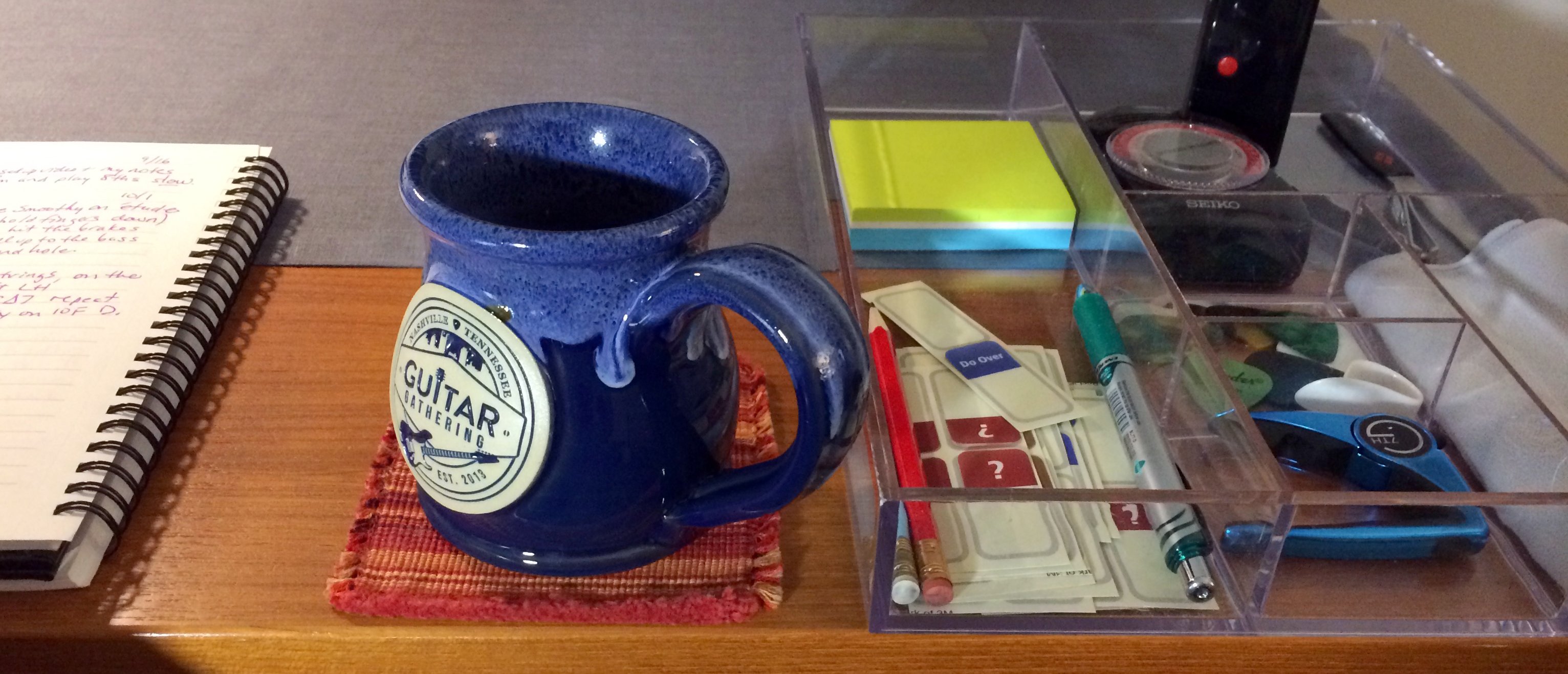

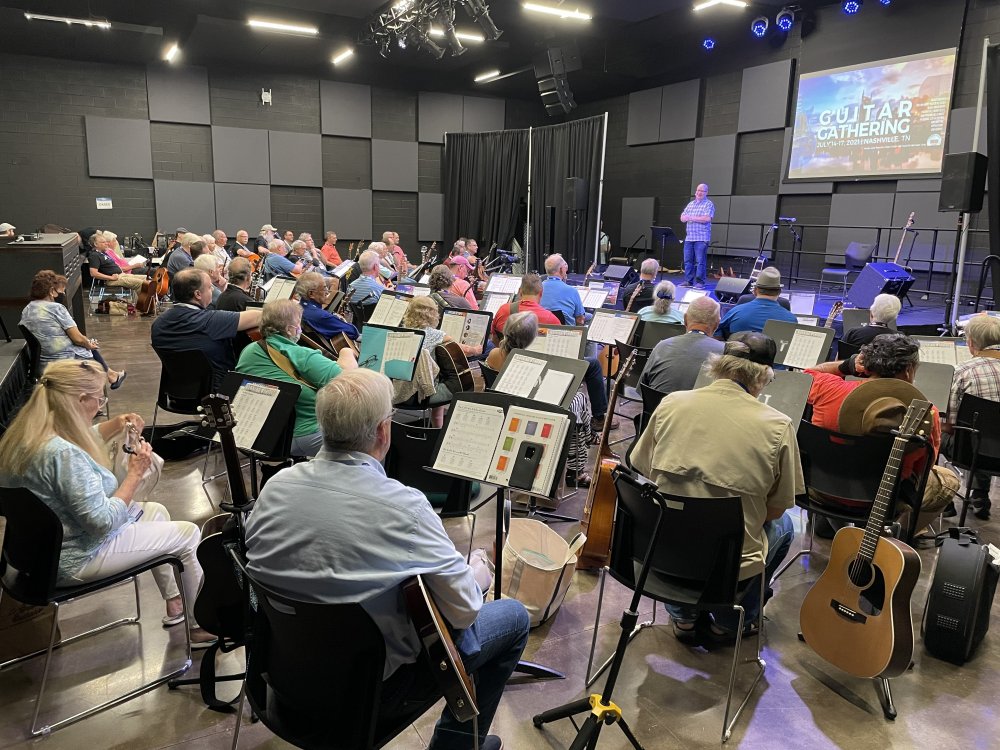
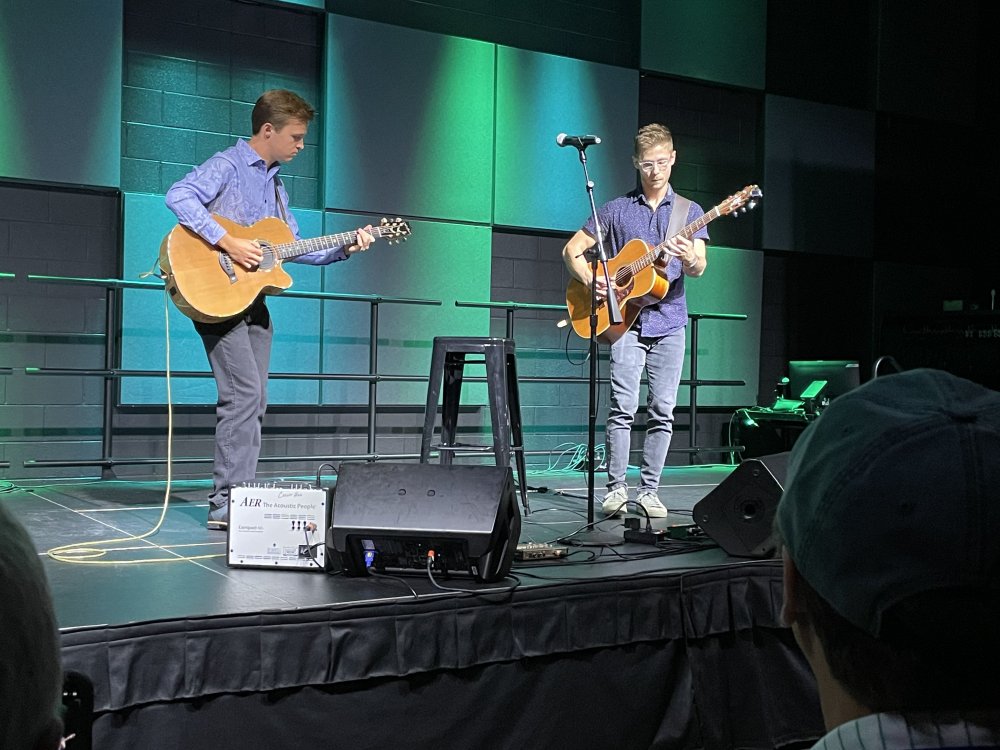
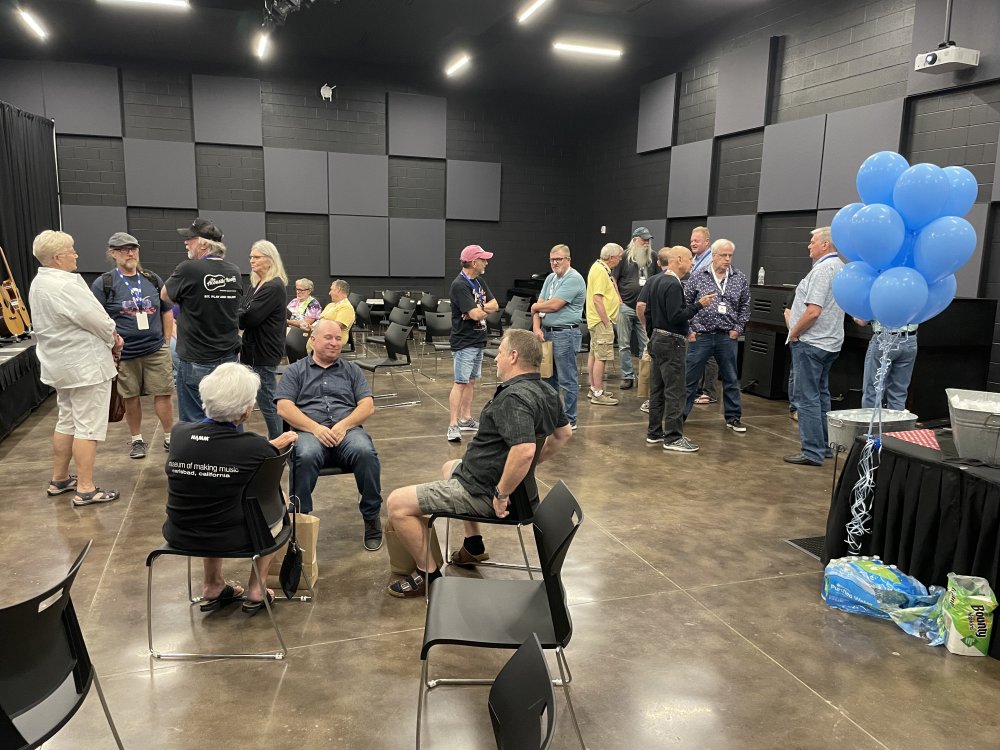
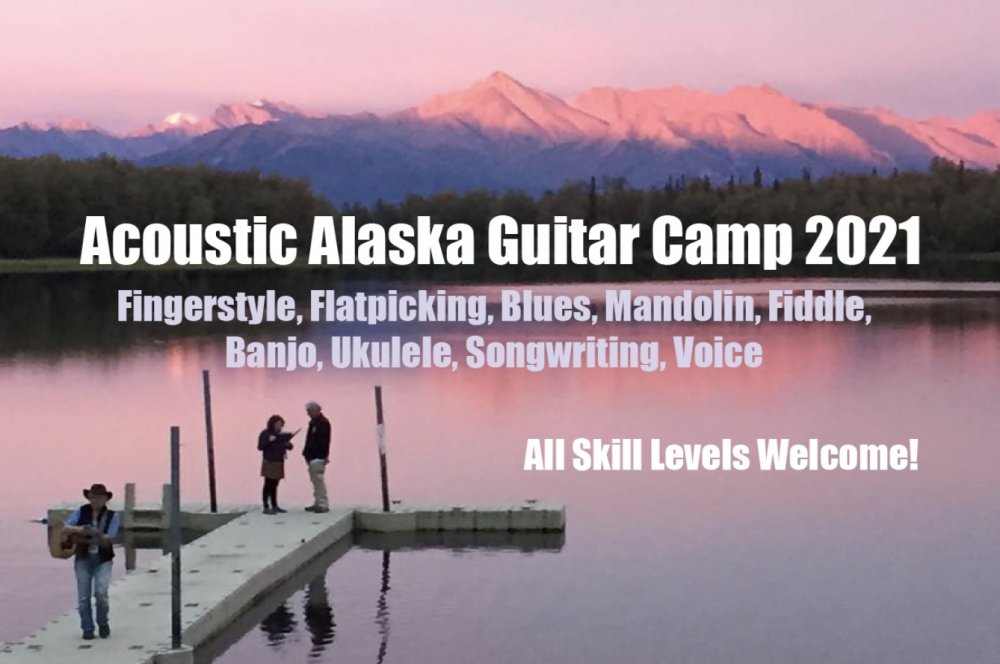
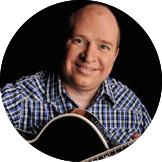
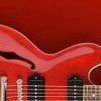
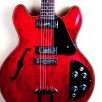
News from the 2021 Gathering
in Guitar Gathering Conferences & Retreats
Posted
Around the first turn we go. Steve’s workout exercised the mechanics of picking and strumming. If the morning coffee had yet to kick in, the pot of Bart Walker’s steaming hot blues got us in gear. SRV at ten a.m.? Only at this affair.
I strolled with Greg, first timer Liz, and our fellow migrating bluesbirds to the Subway at the front entrance. It felt good to walk around in the warmth — briefly. Liz and I camped at a table in the music building’s loft and enjoyed some leisurely quiet time getting acquainted over our sandwiches.
Back in songwriting class, Kim critiqued some raw and finished compositions that had been sent to her overnight. She pitched us an pop exercise straight out of a prose writer’s workshop — two minutes to write seven song titles — 3, 2, 1, go! I managed three duds, a maybe, and a keeper that got her attention.
Meanwhile, Steve and Paulette continued teaching theory and Collin had the fingerpickers a-boom-chucking away. Andy Reiss set the jazzers’ axes to “Phrase”, and Jim Hurst mowed down the bluegrass tricks. Kim kept my class running overtime, and I was on a roll, so I lingered until she had to leave. It meant skipping Steve’s worship music class, but my compensation was a blissful, quiet respite in the lounge before returning to Dino’s blues jam. We all piled back into the main room to wrap up with Parker Hasting’s thumb picking masterclass. He’s not quite twenty one years old and already teaches with more clarity and poise than a lot of tenured professors I’ve known.
Jim Hurst and his trio entertained us at our evening concert with a sweet mix of toe tappers, ballads, and endearing stories. And his handshake? Warm as the Tennessee sunshine.